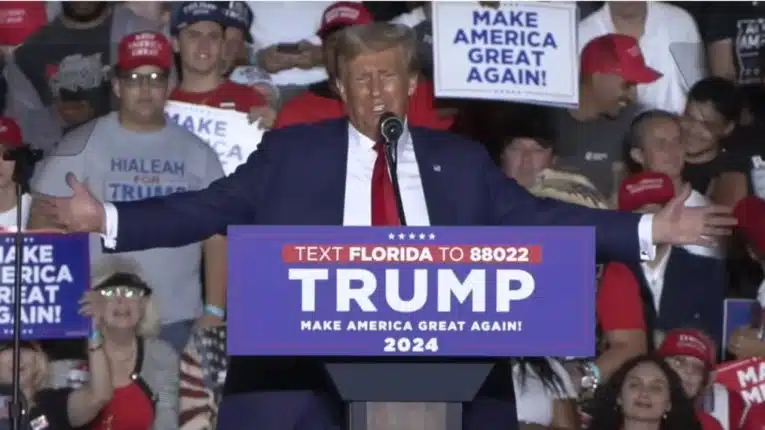
The memo deliberately limited its focus to “the circumstances in which the U.S. government could use lethal force in a foreign country outside the area of active hostilities against a U.S. citizen who is a senior operational leader of al-Qa’ida or an associated force.”
It claims it did not set forth nor examine “what might be required to render a lethal operation against a U.S. citizen lawful in other circumstances.”
Nonetheless, the white paper reveals the Administration’s views on the overall legality of targeting U.S. citizens with deadly force, raising startling questions over how broad presidential war powers really are. For, whether intending to or not, it does in fact provide the legal basis for targeting U.S. citizens “in other circumstances.”
It cites the President’s authority “arising from his constitutional responsibility to protect the country, the inherent right of the United States to national self defense under international law, Congress’ authorization of the use of all necessary and appropriate military force against this enemy, and the existence of an armed conflict with al-Qa’ida under international law.”
The memo continues, “Based on these authorities, the President may use force against al-Qa’ida and its associated forces.” Including U.S. citizens.
But what about the Fifth Amendment to the Constitution, which states, “No person shall be… deprived of life, liberty, or property, without due process of law”? Wouldn’t that preclude the invocation and exercise of war powers against a U.S. citizen?
The memo answers: “Were the target of a lethal operation a U.S. citizen who may have rights under the Due Process Clause… that individual’s citizenship would not immunize him from a lethal operation.” Why?
The memo states, “[T]hat interest must be balanced against the United States’ interest in forestalling the threat of violence and death to other Americans that arises from an individual who is a senior operational leader of al-Qa’ida or an associated force of al-Qa’ida and who is engaged in plotting against the United States.”
The Fifth Amendment protection of life is apparently not absolute, although one struggles to find an exception to the Due Process Clause in the text of the Constitution itself. It can only be inferred.
Perhaps that is why the memo also cites judicial precedent: “The Supreme Court has held that the military may constitutionally use force against a U.S. citizen who is a part of enemy forces,” referring to the Hamdi v. Rumsfeld decision that allowed for the enemy detention of a U.S. citizen.
That 2004 ruling stated, “We conclude that detention of individuals falling into the limited category we are considering, for the duration of the particular conflict in which they were captured, is so fundamental and accepted an incident to war as to be an exercise of the ‘necessary and appropriate force’ Congress has authorized the President to use.”
Surely, then, in the White House’s view, the Court would interpret that the use of lethal force, regardless of citizenship, is an incident of war “so fundamental and accepted” as to be “necessary and appropriate force” under Congress’ authorization. In other words, the Administration believes if it came up for judicial challenge, it would be upheld.
However, one thing the memo neglects to point out from the Hamdi decision is that the Court clearly ruled that the defendant also had a constitutional, due process right under the Fifth Amendment as a U.S. citizen to “be given a meaningful opportunity to contest the factual basis for that detention before a neutral decisionmaker.”
It’s hard to imagine those due process rights are being respected after the drone has launched its missile.
By cherry-picking Hamdi and ignoring the Court’s emphasis on the protection of the individual rights of American citizens in that case, one can only conclude that this was a memo written to justify actions by this Administration rather than one written to instruct on how to uphold the law. Otherwise, that aspect of the decision would have been of obvious legal concern.
So, the White House has shown its hand. Without a doubt, it views it has authority to target U.S. citizens if they are deemed to be a part of the enemy, regardless of any due process claims the target might have raised had he been captured about his status as an enemy combatant.
Where this ends is anyone’s guess.
For example, it is hard to see where geography would come into play under the type of precedent that is being created. Would the authorization to use military force against U.S. citizens also apply to U.S. soil?
The answer is, if this Administration, or any administration, merely took a broader view of what Congress has authorized it to do, geography would be no limitation whatsoever to the exercise of war powers here.
While the memo may not have been intended to address “what might be required to render a lethal operation against a U.S. citizen lawful in other circumstances,” it did not need to. It would essentially be the same argument.
NBC News is to be credited for breaking this story. It was an incredible act of journalism. But perhaps they should start connecting some of the dots and ask the question if the Administration views this as a wider authority. Ask how the Hamdi ruling, which upheld due process rights, can now be turned on its head to deprive them.
Because whether courts would uphold such a lethal use of force against citizens is not necessarily an open-and-shut case. Based on the Hamdi decision, the Due Process Clause still very much applies even when war powers authorized by Congress are being exercised.
If the Administration views this in a broader context, as the memo indicates, it would appear that the military is being conditioned to follow and issue orders that may be constitutionally questionable at best. And now they may have the legal pretext to complete them.
Bill Wilson is the President of Americans for Limited Government. You can follow Bill on Twitter at @BillWilsonALG.







